Wild Lives, Wild Joy
by Kristen Weiss, Public Engagement Coordinator for Project Coyote
As the sun begins to dip below hillsides covered in needlegrass, wild buckwheat, and sage, casting a golden shadow across a valley covered with lemon trees, Momma Coyote bids her three pups farewell and steps cautiously out of her earthen den at the edge of the grove. It is her turn to seek out the evening meal.
The ground is still warm, and the rattlers, gopher and king snakes elongate their bodies on exposed dirt to absorb the last of the day’s heat. Between the trees, overgrown brush provides refuge for ground squirrels and cottontails; quails and roadrunners; skunks, mice, and lizards.
With a supernatural lightness to her step, Momma Coyote travels through the brush, nearly silent, as she seeks out a meal to bring back to her family. Her stealth is not only important for a successful hunt; it also protects her from detection by mountain lions, large dogs, and humans who may have ill intentions. Momma Coyote and her kin are the most persecuted native carnivores in the United States.
Hundreds of thousands of coyotes are killed each year by hunters, trappers, ranchers, and government agencies. In most states—including my home state of California, where I share land with the Momma coyote and her family—coyotes have minimal legal protections. They are subjected to unrestricted, year-round hunting. So are many other wild carnivores.
Some of the farmers I know have a deep respect for coyotes and other wild animals, and have no problem sharing their land with them. But many farmers, ranchers, and hunters harbour an unfounded resentment for wild carnivores, which they channel into relentless hunting and mass killings.
Every year, tens of thousands of wild animals—including coyotes, bobcats, foxes, mountain lions, prairie dogs, crows, raccoons, and wolves—are slaughtered in wildlife killing contests. The motive of these contests is not to feed one’s family or protect one’s life; it is to kill for the pure ego and “pleasure” of killing. In these barbaric events, participants compete to kill the greatest number, the largest or even the youngest of the target species for prizes and entertainment. These contests exploit the lack of killing limits or restrictions for many of these species. Coyotes, the most frequent target of Wildlife Killing Contests, can be hunted in unlimited numbers, using almost any method (from snares and poisons to killing pups in dens) in most U.S. states.
Needless to say, Momma Coyote faces a difficult task in feeding her growing pups and keeping them safe. She and her partner must nurture and provide for their young while avoiding conflict, both with other wild animals and with humans who may wish to do them harm. Every night that I hear her trumpet-call howl, my heart swells with relief—she is alive.
Like many wild animals, coyotes live difficult lives, often cut short not only by direct human conflict but also by disease and habitat loss. Yet they are incredibly intelligent and adaptable, and have learned to thrive equally in rural, urban and suburban settings. Coyotes are not only impressive hunters and devoted parents; they are also emotionally complex animals who express joy, fear, curiosity, and compassion.
Wildlife photographer Larry Taylor, who has spent years photographing individual animals and getting to know them throughout their lives, has described one coyote’s love of sunsets, and a grizzly bear who watches over her cubs with more devotion than most. Countless photos and videos circulate on social media showing coyotes discovering the joy of jumping on backyard trampolines, rolling down golf course hills with goofy grins, and playing gleefully with abandoned dog toys. Black bears have been filmed taking leisurely dips in neighborhood swimming pools; wild foxes approaching musicians to enjoy live music; and countless other instances of wild animals expressing emotions and preferences that reflect our own.
These glimpses into the lives of wild animals are important reminders of the rich emotional landscape we all share. These wondrous creatures can teach us so much about ourselves.
Outside, I listen as some nights, other voices join in Momma Coyote’s howls to create a resonant chorus; her mate and other family members are checking in with each other. Together, they sing a song of survival, of recognition, and of resilience. After a round of excited yips, the chorus fades, and Momma returns to her three wriggling pups, who have learned to wait patiently inside the den while their parents take turns venturing off in search of rabbits or squirrels. For today, at least, she can rest knowing that she and her family are safe and provided for.
I wish I could guarantee her more. But for now, I share her story, and promise to use my voice to encourage compassion and respect for her family and all of our wild neighbors.
A NOTE AND CALL TO ACTION FROM AUTHOR, :
I’m grateful to work with Project Coyote to build a future where compassionate conservation is the norm, humans and wild carnivores coexist, and ecosystems thrive. Here are some of our campaigns, along with links to get involved:
Project Coyote’s campaign to End Wildlife Killing Contests aims to end this bloodsport state by state and on all federal public lands. Through national efforts to raise awareness about wildlife killing contests, in part through our co-founded National Coalition to End Wildlife Killing Contests, public scrutiny of these contests is growing. Roughly 80% of the U.S. public supports banning these contests. Our federal and state-based campaigns pressure state policymakers—including state wildlife management agencies—to take action. To date, we have helped ban killing contests in ten states, and we have ongoing campaigns in several more.
Our work to end killing contests bolsters our efforts to address widespread and unjust persecution of wild carnivores through proactive conservation leadership, and defines a national narrative that wild lives should be protected for their ecological and intrinsic value. Our goal is to promote compassionate conservation and coexistence with wild carnivores.
You can help us by signing the petition on our website to Ban Wildlife Killing Contests, and by joining our e-team to receive regular action alerts and other important updates on ways you can help to protect wild lives. We welcome you into our growing community of wild carnivore advocates.
Project Coyote’s #CaptureCoexistence Campaign unites nature photographers and videographers to join our efforts to End Wildlife Killing Contests by showcasing the wonder of nature through captivating imagery.
You can also support Project Coyote’s mission by purchasing this print from WVC featured artist The Far Woods, who are donating a portion of the proceeds to Project Coyote.
LEARN MORE ABOUT WVC FEATURED ARTISTS: THE FAR WOODS:
The Far Woods
WILD VOICES COLLECTIVE is a bridge where artists share their talents to amplify voices of the wild. Our summer issue features the work of Nina and Sonya Montengro of The Far Woods. 25% of proceeds from the following pieces support the vital work of Project Coyote

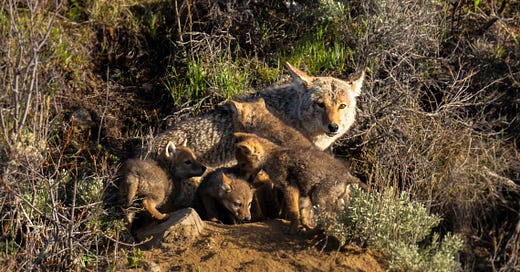



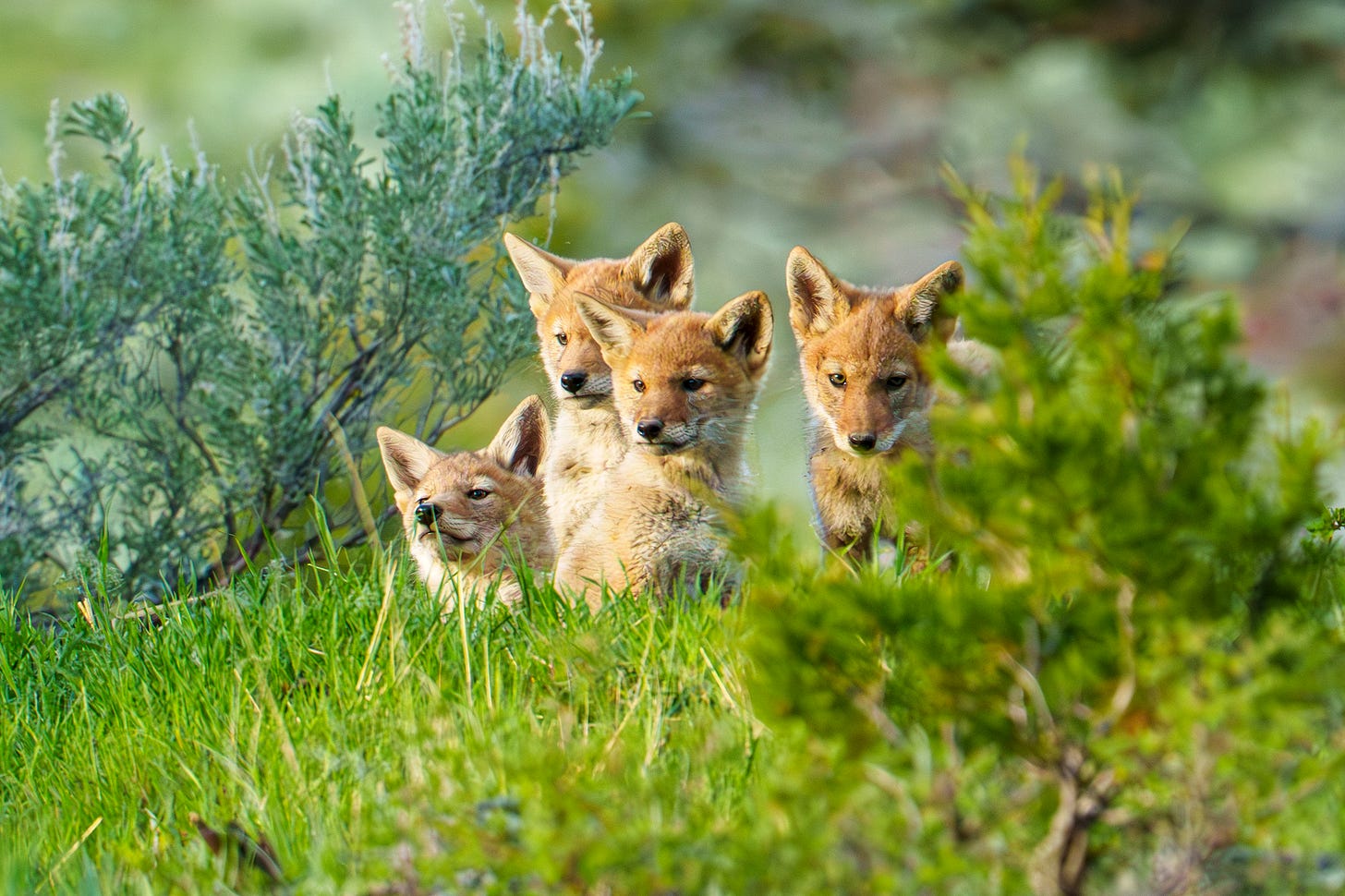
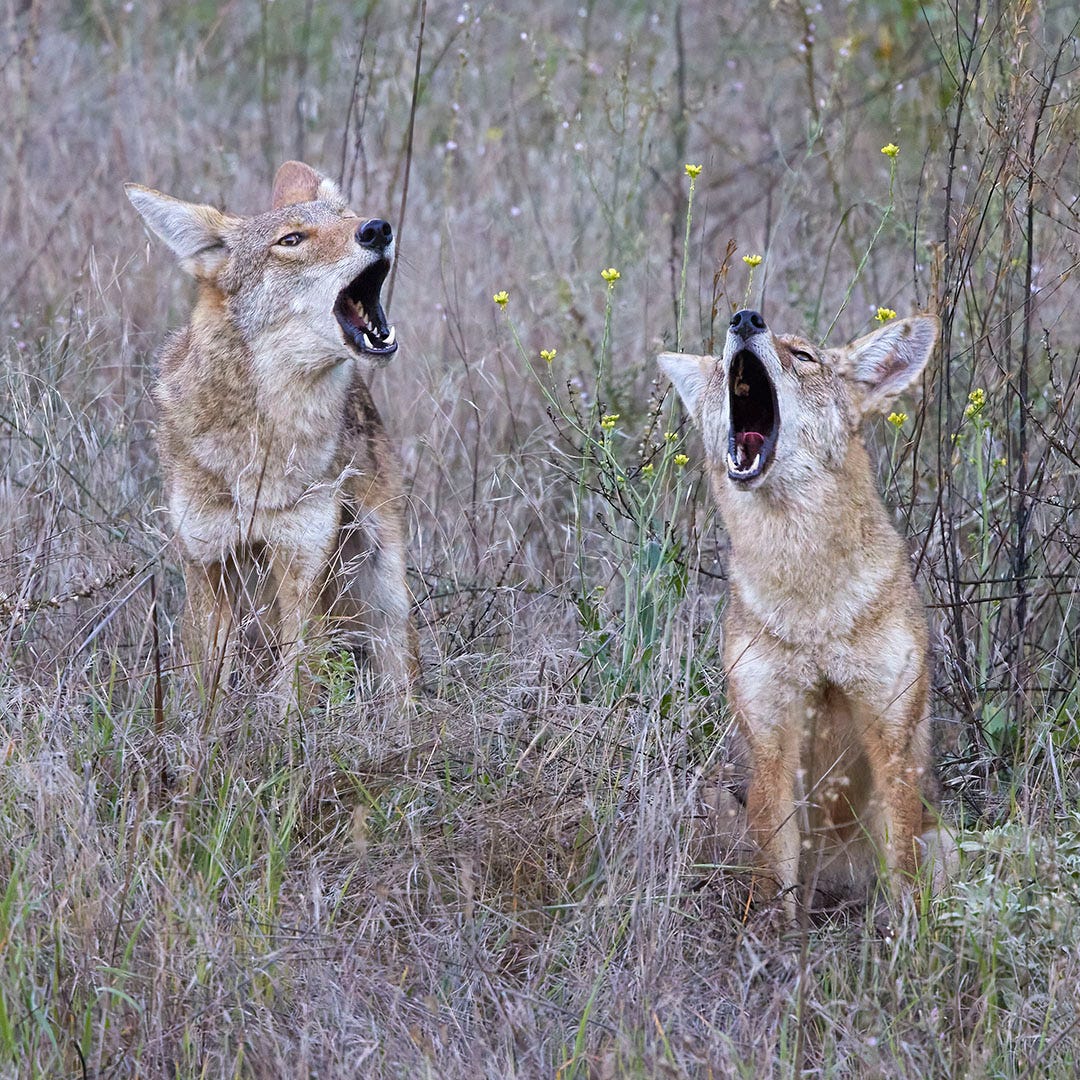
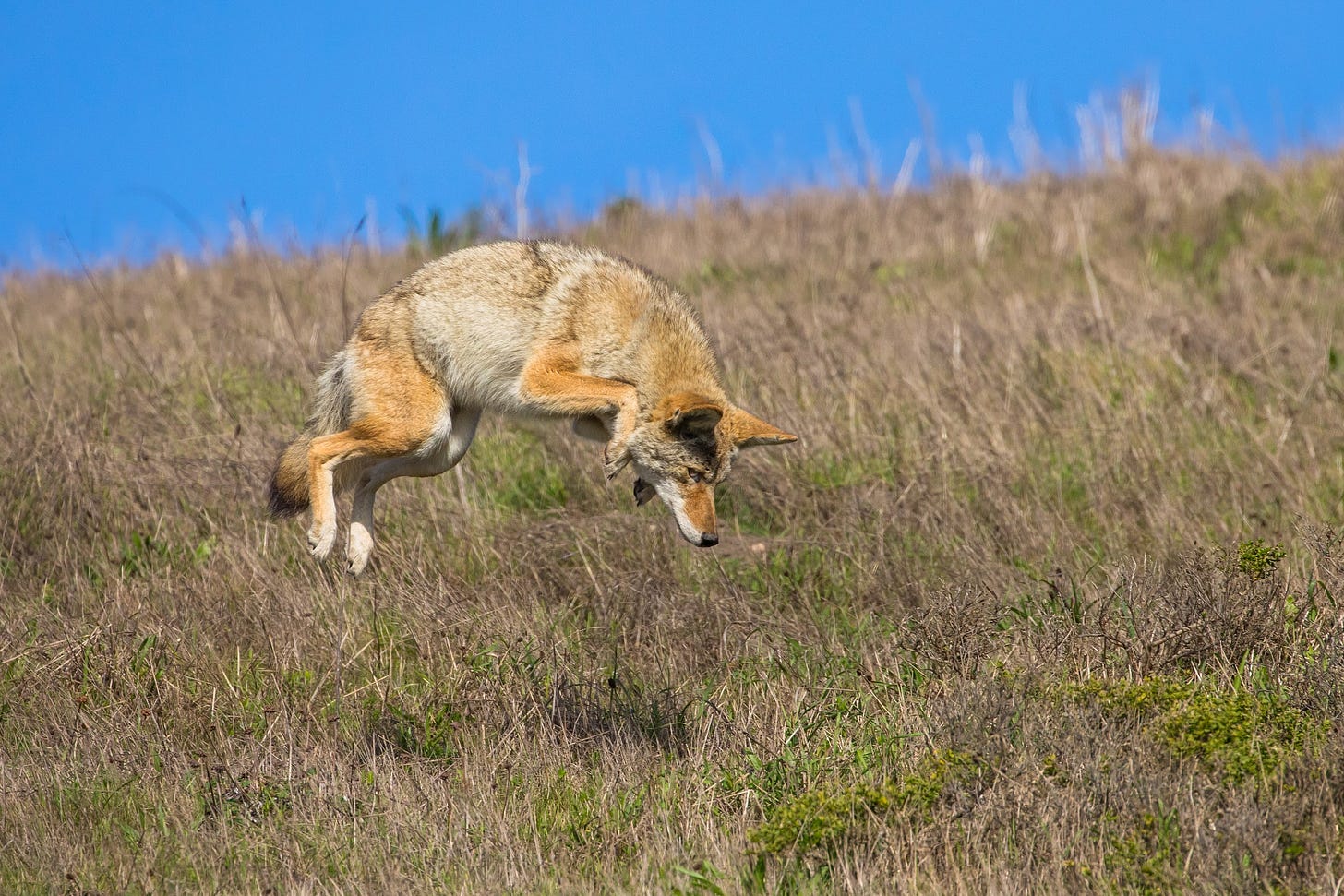
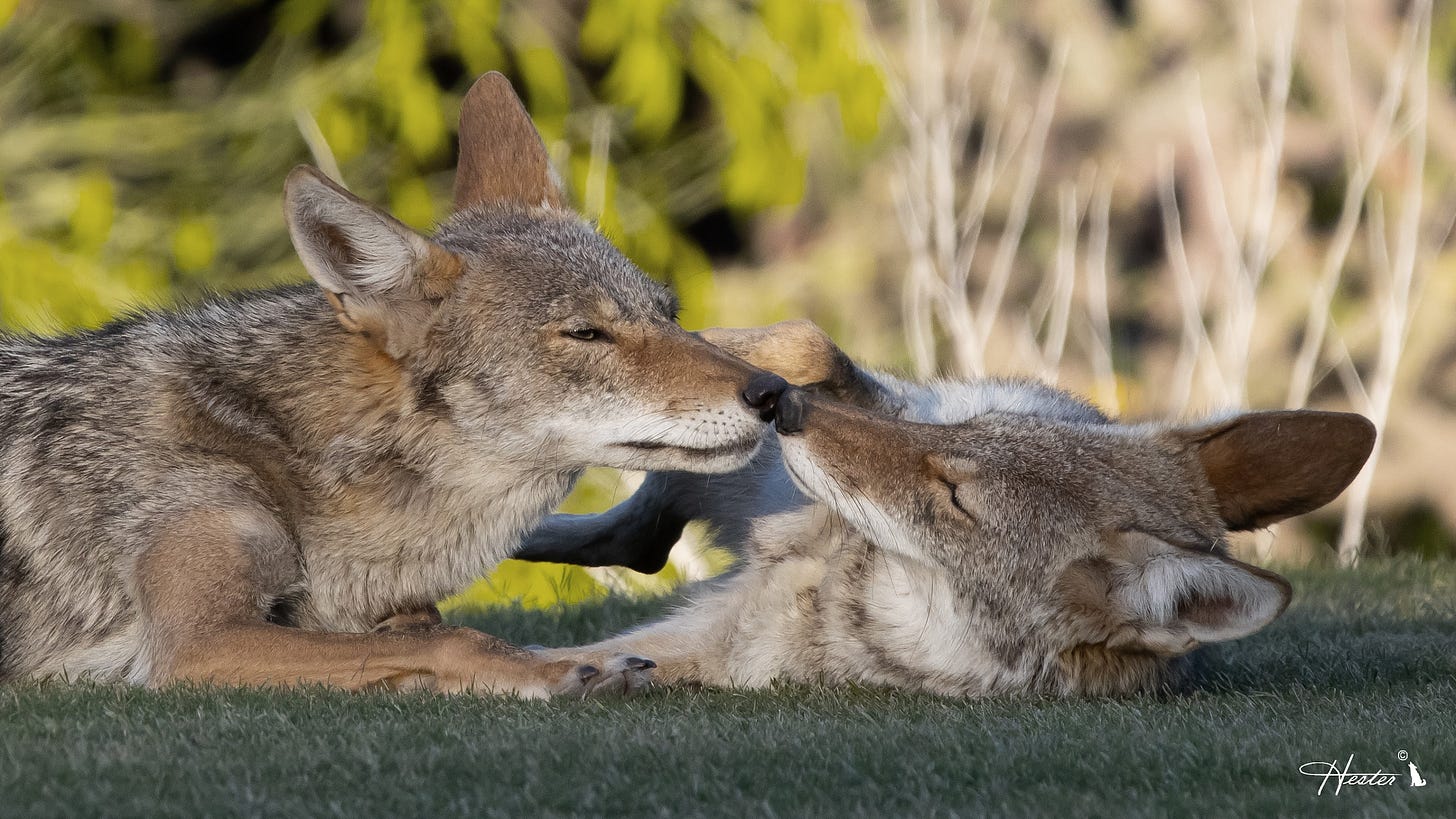

I... had no idea about these killing contests! That's awful. My dog's favorite pastime was barking at the coyotes who used to trot by my mom's former home. We noticed a marked uptick in the number of coyote sightings when work started on a new development in the area. Always made me sad to think of how their habitats are ever-shrinking.